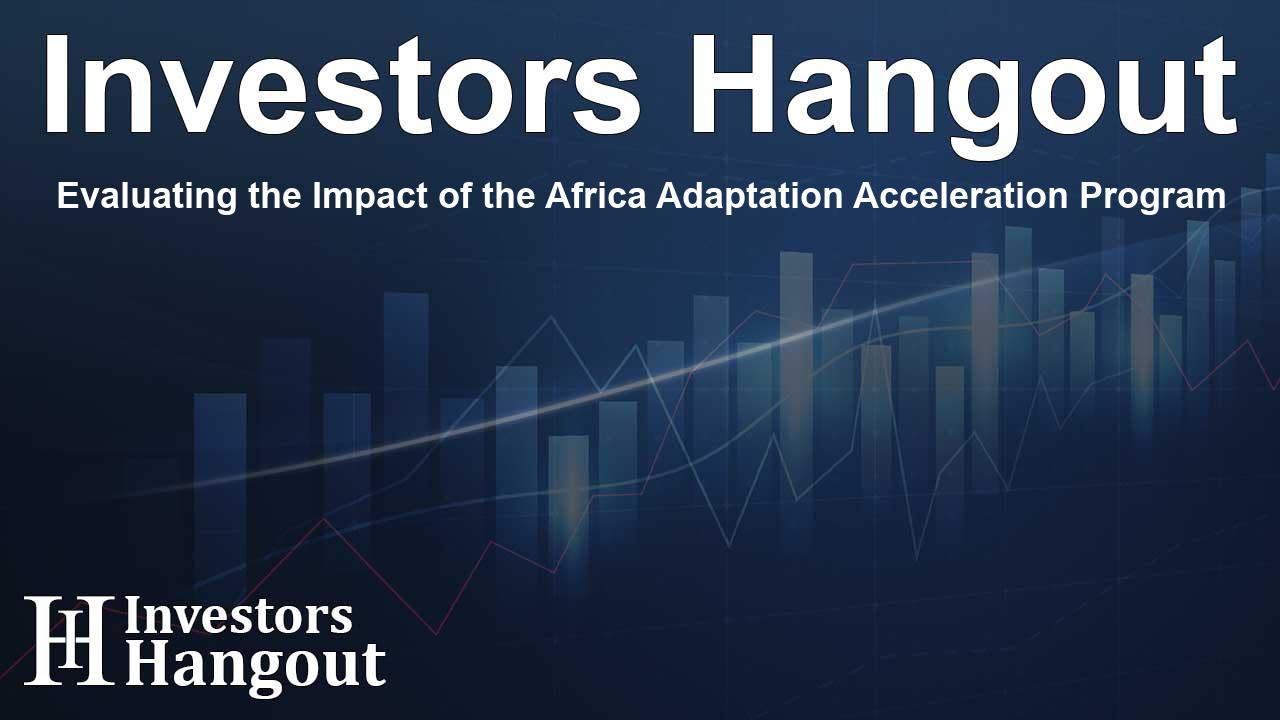Evaluating the Impact of the Africa Adaptation Acceleration Program

Significant Impact of the Africa Adaptation Acceleration Program
Recently, the Global Center on Adaptation (GCA) expressed satisfaction with the independent evaluation results of the Africa Adaptation Acceleration Program (AAAP). This assessment was conducted by the Boston Consulting Group (BCG) and marks an important milestone for the program.
The evaluation, which spanned the years from its inception in 2021 up to now, analyzed a comprehensive amount of data collected from over 40 interviews with stakeholders, including funders, partners, and beneficiaries. The findings suggest that AAAP has effectively influenced nearly USD 19 billion in approved investments from various International Finance Institutions (IFIs) and is well on its way to its goal of USD 25 billion by the end of the year.
Understanding the Scale of Investment
These substantial investments have reached around 40 African nations, contributing to climate adaptation efforts that are expected to benefit approximately 200 million individuals by enhancing their resilience. Aly-Khan Jamal, the Managing Director at BCG, stated that this evaluation not only recognizes the current successes of AAAP but also highlights the potentials for future improvements through enhanced measurement and broadened partnerships.
The program's unique approach as a solutions-broker, which combines technical skill with systemic influence, has positioned it to significantly assist both governments and development partners. This ensures that vital services, such as infrastructure and agriculture, continue to thrive even as the continent faces increasing climate challenges.
Insights from the Evaluation
Moreover, the evaluation outlined the multifaceted nature of AAAP’s intervention strategies, encompassing key areas of focus:
Food Security Initiatives
Within the realm of Food Security, investments have included climate-smart agricultural practices and improved digital advisory services. These measures have provided resilience, particularly in agricultural sectors, enabling farmers to adapt effectively to changing climate conditions.
Infrastructure and Nature-Based Solutions
Another highlight is the Infrastructure and Nature-Based Solutions focus area, which has promoted resilience in urban development and water management systems. Local adaptations have not only maximized value-for-money but also fostered community-driven change.
Youth Employment and Adaptation Jobs
The initiative has notably promoted Youth Entrepreneurship and Adaptation Jobs, generating over 10,000 new employment opportunities. However, the evaluation indicates that further scaling is necessary to fully integrate adaptation into the economic fabric of the continent.
Advancements in Adaptation Finance
In terms of Adaptation Finance, notable steps have been taken to stimulate private and domestic investments, including pilot projects aimed at stress-testing bank portfolios. Yet, the evaluation emphasizes that the catalytic effects are still in the early stages.
Looking Toward the Future
As AAAP approaches its next phase, AAAP 2.0, various recommendations have emerged from the evaluation to enhance the program. These include strengthening monitoring and evaluation systems to better track outcomes and expanding partnerships to engage private capital more effectively. Additionally, ensuring policy and beneficiary support is crucial for sustaining long-term impact.
Renowned figures like Ban Ki-moon and H.E. Macky Sall have underscored the importance of this program in not only securing investments but also transforming livelihood prospects for millions across Africa. Their advocacy calls for a commitment to bridge the adaptation finance gaps and move towards actionable, systemic reforms.
Frequently Asked Questions
What is the Africa Adaptation Acceleration Program (AAAP)?
The AAAP is a pioneering initiative launched to support climate adaptation across Africa by facilitating investments and policies that enhance resilience in vulnerable communities.
Who conducted the evaluation of the AAAP?
The evaluation of the AAAP was conducted by the Boston Consulting Group (BCG), which provided an independent assessment of the program’s effectiveness and impact.
How much investment has AAAP influenced so far?
As of now, the AAAP has influenced nearly USD 19 billion in board-approved investments from International Finance Institutions, with a target of reaching USD 25 billion.
What are the key focus areas of AAAP's interventions?
The AAAP focuses on Food Security, Infrastructure and Nature-Based Solutions, Youth Entrepreneurship, and Adaptation Finance to drive significant adaptation initiatives across Africa.
What are the next steps for the AAAP?
The program aims to launch AAAP 2.0, which will focus on strengthening measurement and evaluation systems, expanding partnerships, and ensuring ongoing policy support to enhance its impacts.
About The Author
Contact Lucas Young privately here. Or send an email with ATTN: Lucas Young as the subject to contact@investorshangout.com.
About Investors Hangout
Investors Hangout is a leading online stock forum for financial discussion and learning, offering a wide range of free tools and resources. It draws in traders of all levels, who exchange market knowledge, investigate trading tactics, and keep an eye on industry developments in real time. Featuring financial articles, stock message boards, quotes, charts, company profiles, and live news updates. Through cooperative learning and a wealth of informational resources, it helps users from novices creating their first portfolios to experts honing their techniques. Join Investors Hangout today: https://investorshangout.com/
The content of this article is based on factual, publicly available information and does not represent legal, financial, or investment advice. Investors Hangout does not offer financial advice, and the author is not a licensed financial advisor. Consult a qualified advisor before making any financial or investment decisions based on this article. This article should not be considered advice to purchase, sell, or hold any securities or other investments. If any of the material provided here is inaccurate, please contact us for corrections.
